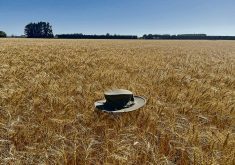The Canadian Grain Commission (CGC) is seeking a new chief commissioner.
Patti Miller, who has held the position for three years, announced Tuesday to CGC staff that she will retire June 26.
Agriculture and Agri-Food Canada (AAFC) “will be launching an open, transparent and merit-based process to find a new commissioner as soon as possible,” federal Agriculture Minister Marie-Claude Bibeau said via email Thursday.
Meanwhile, an AAFC-led review of the Canada Grain Act — and of the CGC’s role in administering it — will continue. The department quietly announced the review last March.
Read Also

Pea, lentil outlooks have some positive signals – Penner
As pulse growers consider what to plant this spring, Chuck Penner of Leftfield Commodities Research said there is some optimism in the Canadian pulse market. Penner gave a presentation at the Saskatchewan Pulse Growers meeting in Swift Current on Feb. 4.
“Our government remains committed to modernizing Canada’s Grain Act,” Bibeau said. “While the process is still taking shape, we are committed to holding consultations in order to hear from grain farmers, stakeholders, and parliamentarians.”
Under the Grain Act, the CGC — created in 1912 in the “interest of producers” — regulates Canada’s grain industry by overseeing grain quality regulations and acting as an industry watchdog.
The CGC is overseen by the chief commissioner, an assistant chief commissioner and a commissioner.
Reliable sources have accused Miller of having a pro-grain company agenda, which, in their view, could hurt farmers. They also alleged Miller had sidelined input from assistant chief commissioner Doug Chorney, who farms at East Selkirk, Man., and commissioner Lonny McKague, who farms at Omega, Sask.
Miller denied that claim. “I have a huge amount of respect for both Doug and Lonny,” she said in an interview last March 18. “Does that mean we agree on everything? Heavens no.
“Did Doug and Lonny have input into it, as did I? Yes. Was it exactly how they wanted to see it? Perhaps not, but they are a voice and provide input into that process.”
On the allegation she favours the grain companies’ agenda, Miller replied: “If you asked the industry they might give some comments that… I’m not making decisions unilaterally in their favour. We have rigour in our decision-making.”
What grain companies want most from the review are recommendations to amend the Grain Act to end mandatory CGC outward inspection.
Some grain companies say it’s redundant and costly because many of their customers are satisfied using less-expensive private inspection services.
But some in the industry say making the CGC’s ‘Certificate Final’ optional will undermine Canada’s grain quality assurance system.
Speaking last March 6 at the Canadian Crops Convention in Montreal, Viterra CEO Kyle Jeworski argued in favour of ending mandatory CGC outward inspection.
“I think it’s important that we have the Canada Grain Act to better reflect our industry today and prepare for the future,” he said. “We need to remove unnecessary regulations. There are many examples — grain grading, weighing, inspection. There are things that add cost and delays in our industry.”
But the three Prairie general farm organizations agree the CGC’s oversight is more important than ever because of the rise in non-tariff trade barriers.
AAFC wants farmer input on the review, as Michelle Bielik, director of the ag department’s crop and supply chain policy division, told Keystone Agricultural Producers’ advisory council meeting in Portage la Prairie, Man. last April 2.
“We are right now just gathering our thoughts about how we’re going to conduct our analysis,” she said at the time. “That’s why we want to hear from you about the issues you want to focus on. We are nowhere near tabling proposals and when the time comes we hope we are in a position to engage with you further.”
Much of that work would be done during the election period that fall, Bielik said at the time. “Ultimately our goal is to have a set of legislative proposals to include as part of the minister’s next mandate.”
Although Bibeau confirmed Thursday that AAFC’s review continues, there’s no specific reference of it in her mandate letter from Prime Minister Justin Trudeau.
On the matter of Miller’s retirement announcement, Bibeau said Miller “has been dedicated to the grain sector for over 35 years, and felt it was time for her to retire.
“During (Miller’s) time at the CGC, she has helped modernize the organization and begin the review of the Canada Grain Act. In order to ensure an orderly transition, Ms. Miller will be in place (at the CGC) until June 2020.”
Miller, Chorney and McKague were all appointed to their positions by the federal government in early 2017, after having applied to serve.
Miller’s 35-year career in agriculture included 25 years with the federal government. She also worked for Cargill and was president of the Canola Council of Canada at the time of her CGC appointment.
— Allan Dawson is a reporter for the Manitoba Co-operator at Miami, Man.















